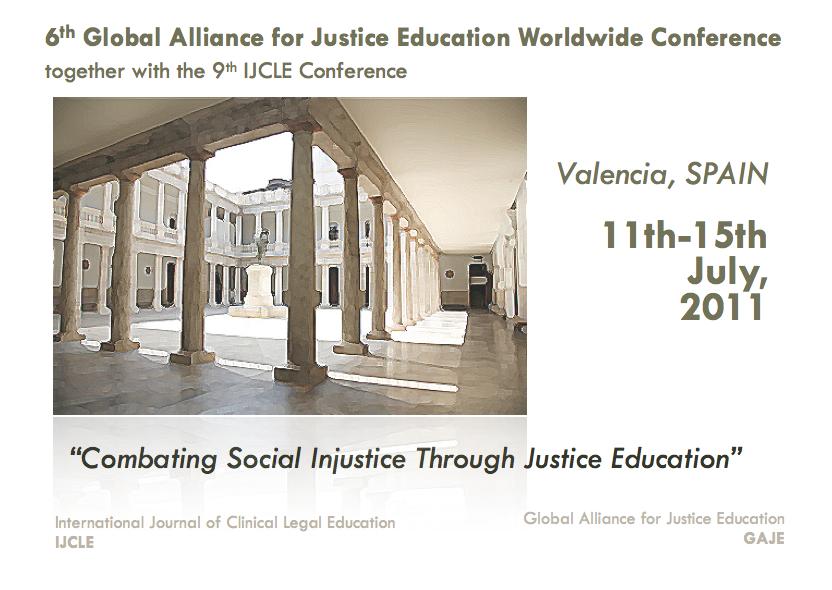About the organizers and host
GAJE held its 6th worldwide conference on July 11-15 in Valencia, Spain. The conference was held in partnership with the 9th International Journal of Clinical Legal Education (IJCLE) Conference and was hosted by the Institute of Human Rights, Faculty of Law, University of Valencia. Other local partners included the Legal Clinic at the University of Valencia; the Human Rights Institute Bartolomé de las Casas at University Carlos III in Madrid, the Legal Clinic “Dret al Dret” at the University of Barcelona, and CEDAT (Centre d’Estudis de DretAmbiental de Tarragona) at the University Rovira i Virgili in Tarragona.
Prior to the Valencia conference, GAJE had organized five international conferences in India (1999), South Africa (2001), Poland (2004), Argentina (2006), and the Philippines (2008). To review reports from prior GAJE conferences, click here.
IJCLE is part of the School of Law at Northumbria University in England. The annual IJCLE conferences serve as unique forum in which clinical educators from all jurisdictions can come together to discuss all aspects of clinical teaching and learning, to learn from one another and to share best practice. More information is available at: www.ijcle.com
The Valencia conference offered the opportunity for law teachers, law students, legal practitioners, jurists and social activists to acquire new ideas, models, and skills for the use of education to promote social justice. The Conference also played a key role in charting the future role of GAJE in the Global Clinical Movement. In a range of plenary, small-group, and workshop sessions, approximately 300 delegates from more than 40 countries explored Justice Education as a concept for presenting, discussing, and creating innovative ideas for promoting social justice through new and existing university legal clinics.
The conference was structured to facilitate as much participation as possible by those attending. While there were a small number of plenary sessions, including a few key note speeches, most of the conference consisted of small group sessions, interactive workshops, and other opportunities for sharing ideas, materials, etc. There were also some organized site visits to local justice education projects.
Conference sessions were organized in steams, some of which followed the GAJE theme (“Combatting Social Injustice Through Justice Education”) and others the IJCLE theme (“Life, the Universe and Clinic: What questions does Clinic answer?”). The main streamsunder the GAJE theme are set out below. The full conference program and a list of all conference speakers, with links to session abstracts and short biographies of the speakers can be accessed in the “6th Conference Details” box on the upper right of this page.
Legal Clinics and Human Mobility (This stream focused on the practical and social justice aspects of migration and the role of legal clinics in destination countries for promoting rights of migrants, refugees, and asylum seekers.)
Legal Clinics and Socio-Economic Rights (This stream focused on ways in which legal clinics can promote social and economic rights, such as the right to education, health, social welfare, etc.)
Legal Clinics and Environmental Justice (This stream focused on social justice and environmental rights and the roles of legal clinics in promoting environmental justice.)
Justice Education and Academic Institutions (This stream focused on the challenges of implementing Justice Education in traditional academic institutions (universities, research institutes, etc.), including issues such as curriculum reform, clinical scholarship, social action agendas, and innovation in clinical teaching methods.)
Justice Education Initiatives (This stream encompassed all new initiatives that focus on forming the new generation of lawyers for social justice, including developing professional ethics, standards for working with vulnerable populations, street law programs, community legal education, etc.)


